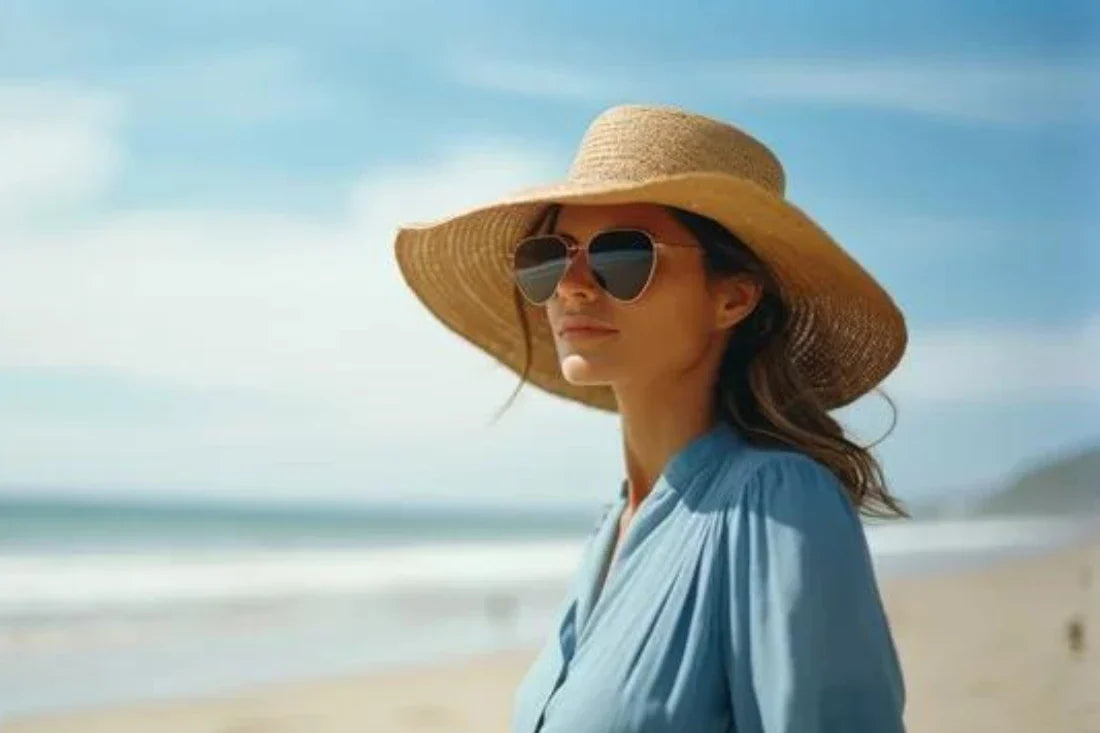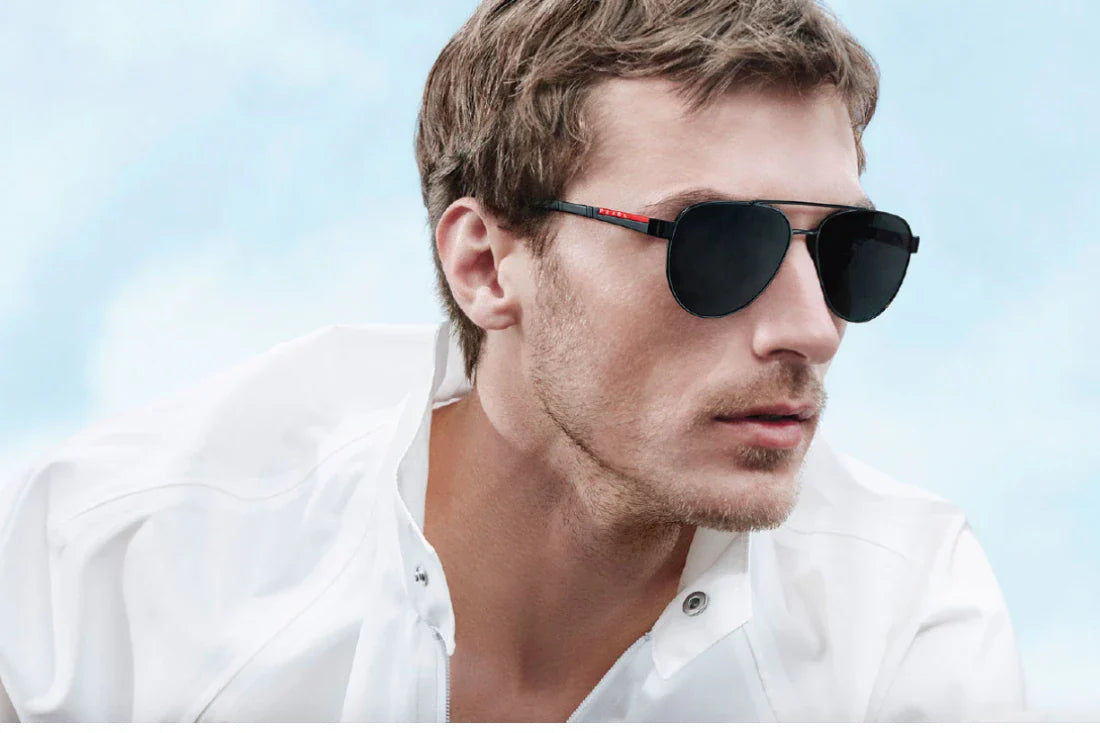The beach beckons with its promise of relaxation, but that sunshine can be a hidden danger for your eyes. Understanding the science behind sun protection and how the beach environment intensifies UV exposure is crucial for choosing the perfect pair of beach sunglasses .
This guide dives deep into the world of beach-worthy sunglasses and lenses, ensuring a day of fun in the sun without compromising your precious eyesight.
The Double Whammy: Why Beach Sunglasses Matter Most
The beach throws a double punch at your eyes. Direct sunlight delivers a hefty dose of UV rays (UVA and UVB), but the real kicker lies in the glare reflecting off the water's surface. This reflected light intensifies UV exposure by up to 50%, significantly increasing the risk of photokeratitis, a painful sunburn of the cornea. Symptoms can range from a gritty feeling to temporary vision loss.
Prolonged UV exposure at the beach can also lead to long-term eye problems like:
Premature aging around the eyes (think wrinkles and crow's feet)
Cataracts: Clouding of the eye's lens, leading to blurry vision
Macular degeneration: A serious eye disease that can cause permanent vision loss, especially affecting central vision
By choosing beach sunglasses with proper UV protection, you're not just shielding your eyes from discomfort – you're investing in their long-term health.

Beyond UV Protection: Unveiling the Science of Beach-Worthy Sunglasses
Now that we've established the importance of UV protection (look for sunglasses labeled "100% UVA and UVB protection"), let's explore the world of beach-worthy sunglasses lenses:
Polarization : Your secret weapon against glare. Polarized lenses contain a special filter that significantly reduces the horizontal light waves bouncing off the water's surface. This translates to sharper vision, allowing you to see details underwater or spot objects in the distance with greater clarity. Studies have shown that polarized lenses also reduce eye strain, making them ideal for long days spent basking in the sun.
Lens Color : It's a science, not just aesthetics. While darker lenses might seem ideal, they can actually strain your eyes in bright beach environments. Here's a breakdown of popular lens colors for the beach:
Grey: A great all-rounder, offering excellent UV protection without overly dimming your surroundings.
Brown or Green: Enhance contrast, making them particularly helpful for seeing underwater or in shady areas. They can also provide a more natural color perception compared to grey lenses.
Visible Light Transmission (VLT) : This refers to the amount of light that can pass through the lens. For beach use, a VLT of 8-18% is ideal, providing good UV protection and comfortable light filtering.
Lens Material : The beach is a harsh environment. Glass lenses, while offering superior clarity, can be heavier and more prone to scratches. Polycarbonate lenses are a popular choice – they're lightweight, impact-resistant, and generally more affordable. Consider Trivex lenses as well – they're even lighter than polycarbonate and offer exceptional optical clarity.
Bonus Fact : Did you know that certain sunglasses lens materials can also block blue light? While blue light is essential for regulating our sleep-wake cycle, exposure to high levels of blue light (like from sunlight reflected off water) can contribute to eye strain and fatigue. Look for lenses that specifically block blue light for an extra layer of protection.
Oakley Prizm: Tailored Technology for the Beach Lovers
LookerOnline, your one-stop shop for premium beach sunglasses, carries brands like Oakley, which offers a line of sunglasses called Prizm that utilizes lens technology specifically designed for various environments. Here's a closer look at the ideal option for the beach:
Oakley Prizm Deep Water
Designed for deep water environments with minimal surface glare, Oakley Prizm Deep Water lenses feature a neutral grey base that cuts through blue light haze commonly found over open water. This allows for clearer vision and better differentiation of objects underwater.
Beyond Style: Caring for Your Beach Companions
Saltwater, sand, and sunscreen can take their toll on your beach sunglasses . Here are some tips to keep them functioning at their best:
Freshwater Rinse : After a day at the beach, give your sunglasses a thorough rinse with cool, fresh water to remove salt and sand. Don't use hot water, as it can warp the frames.
Microfiber Matters : Avoid using paper towels or tissues, which can scratch the lenses. Invest in a soft microfiber cloth specifically designed for cleaning sunglasses.
Proper Storage : Don't leave your beach sunglasses lying around in direct sunlight or heat. Invest in a hard case to protect them from scratches and damage when not in use.

LookerOnline: Your Gateway to Beach-Ready Vision
LookerOnline curates a selection of premium designer sunglasses from top brands, including Oakley. Explore our collection of polarized lenses, various frame styles, and durable materials to find the perfect pair for your next beach escape. With LookerOnline, you can ensure both optimal eye protection and a stylish look, allowing you to focus on creating unforgettable beach memories.
Remember: When choosing beach sunglasses, prioritize sun protection and functionality over aesthetics. Look for sunglasses with 100% UVA and UVB protection, polarized lenses, and a comfortable, secure fit.
By following these tips and exploring the options available at LookerOnline, you can find the perfect pair of beach sunglasses to keep your eyes healthy and your beach days filled with fun.





